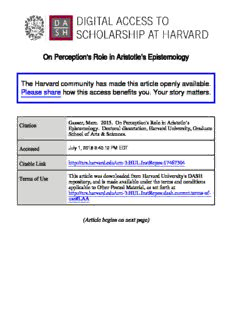
On Perception's Role in Aristotle's Epistemology The Harvard community has made this article ... PDF
Preview On Perception's Role in Aristotle's Epistemology The Harvard community has made this article ...
On Perception's Role in Aristotle’s Epistemology Citation Gasser, Marc. 2015. On Perception's Role in Aristotle’s Epistemology. Doctoral dissertation, Harvard University, Graduate School of Arts & Sciences. Permanent link http://nrs.harvard.edu/urn-3:HUL.InstRepos:17467304 Terms of Use This article was downloaded from Harvard University’s DASH repository, and is made available under the terms and conditions applicable to Other Posted Material, as set forth at http:// nrs.harvard.edu/urn-3:HUL.InstRepos:dash.current.terms-of-use#LAA Share Your Story The Harvard community has made this article openly available. Please share how this access benefits you. Submit a story . Accessibility On Perception’s Role in Aristotle’s Epistemology Adissertationpresented by MarcGasser to TheDepartmentofPhilosophy inpartialfulfillmentoftherequirements forthedegreeof DoctorofPhilosophy inthesubjectof Philosophy HarvardUniversity Cambridge,Massachusetts April2015 © 2015MarcGasser Allrightsreserved. DissertationAdvisor: ProfessorRussellJones MarcGasser On Perception’s Role in Aristotle’s Epistemology Abstract Aristotlethinksallourknowledgecomesfromperception. Yethedoesn’tsay muchaboutthesenseinwhichourknowledgemightbebasedonorderivedfrom thethingsweperceive. Sowhatexactlydoesperceptioncontributetothemore advancedcognitivestatesthatmakeupourintellectuallives,andhowshouldwe understandthenatureofitscontribution? Iarguethatperceptioncontributestothesemoreadvancedstatesbyputting us in touch with particular things in a way that’s responsive to the universals governingtheirbehavior: perceptibleparticularspossesscertainfeaturesbecause theyinstantiatecertainuniversals,andperceptionallowsustodiscriminatethese featuresandexperiencethemasaction-guidingaspectsofourenvironment. Sofor instance,apatientmightexhibitfeverishfeaturesbecausesheinstantiatesmalarial disease,andadoctormightperceivethesefeverishfeaturesandexperiencethem assolicitingsomecourseofaction—assolicitingthatthepatientbeleeched,say. Iexplainhowperception,sounderstood,canserveasabasisforthedevelop- mentofaperceptuallydrivenformofpracticalknowledge(ἐμπειρία);roughly, theformofknowledgepossessedbyadoctorwhoknowshowtocurearangeof patientsbutcouldnotexplainwhyorhowhertreatmentswork. Ithenexplain how such practical knowledge can itself serve as a basis for the theoretically sophisticatedgraspofuniversalsAristotletakesashiscognitiveideal. iii Contents 1 AristotelianEpistemology 1 1.1 Aristotleonunderstanding ....................................... 1 1.2 Aristotle&modernepistemology................................ 12 1.3 Justificationandepistemicpriority ............................... 16 1.4 Understandingandconviction ................................... 23 2 PerceptionAsaStartingPoint 28 2.1 Aristotleonlearning ............................................ 29 2.2 Perceptionasastarting-point .................................... 36 2.3 Perceptionandourepistemicascent .............................. 41 3 PerceptionandInduction 48 3.1 Inductionandscientificunderstanding: interpretivechallenges ..... 50 3.2 TheplaceandroleofAPoB19 ................................... 52 3.3 Theplaceandroleofourepistemicascent ........................ 55 3.4 InductionandepistemicascentinB19 ............................ 58 3.5 Thefirststand: perceptiontocraft-knowledge..................... 66 3.6 Subsequentstands: universalstoνοῦς............................. 73 3.7 Inductionandexplanation ....................................... 77 4 PerceivingUniversals 85 4.1 Perceptionandpsychologicaltheory.............................. 87 4.2 Perceivingandperceivingthat.................................... 91 4.3 Particularanduniversalstates.................................... 94 4.4 Particularperceptionandtheperceptionofuniversals.............100 5 PerceptioninAristotle’sEthics 109 5.1 Ethicsasinexactscience ........................................111 5.2 Perceptionandthecharactervirtues .............................118 5.3 Perceptionandpracticalwisdom ................................126 iv Preface Overview Aristotle often seems to downplay perception’s role in our cognitive life. He characterizes our capacity to perceive as a capacity we share with all animals, and which yields a form of knowledge far removed from the sort of scientific understanding he takes as his cognitive ideal—as he puts it in the Metaphysics, “to perceive is common to all, and therefore easy, and no mark of wisdom” (982a11-12). SuchdismissiveremarksmakegoodsenseifweconsiderAristotle viewsonscientificunderstanding: scientificunderstandingissupposedtoallow us to demonstrate why certain things must be as they are, and perception, as Aristotle emphasizes, never tells us why things are a certain way, and never presentsanythingtousasanecessaryfact. Giventheselimitations,it’snaturalto thinkthatAristotlemusthaveattributedanysignificantepistemicachievement to some other, non-perceptual cognitive capacity—perhaps a form of rational intuition, or at least some capacity related to a distinctively human form of rationalthought. YetAristotlealsoseemstoassignperceptionacriticalroleinourlearning. He oftenclaimsthatallourknowledgeultimatelycomesfromperception—aclaim which(I’llbearguing) playsakeyroleindistinguishinghisepistemologyfrom v recollection theories he sought to dismiss. He also claims that the premises of scientific demonstrations whose conclusions conflict with perceptual evidence should be given up. So perception serves both as a basis for the development of more advanced forms of knowledge, and an authority against which such knowledgeshouldbeassessed. It also plays a key role in Aristotle’s own scientific practice. Consider for instanceAristotle’sdescriptionofbears:1 Thebearisomnivorous. Iteatsfruit,andclimbsuptreesthanksto itsnimblebody. Italsoeatsvegetables,anditwillbreakupabeehive to get at the honey. It eats crabs and ants, too, and is carnivorous. The bear is so powerful it will attack not only deer but also wild boars,ifitcantakethemunawares,andevenbulls. Aftercomingto closequarterswithabullthebearliesonitsback,facingtheanimal, and,whenthebulltriestocharge,itgrabsthebull’shornswithits front paws, fastens its teeth into its shoulder, and drags it down to theground. Forashorttimeitcanwalkerectonitshindlegs. All thefleshiteatsitfirstallowstorot. (HA594b6-16) Itseemsimplausiblethatsomeonededicatedtosuchcareful,detailedobservations ofanimallifewouldseektodownplayperception’scontributiontoourlearning. My aim in this dissertation is to provide an interpretation of perception’s role in Aristotle’s epistemology. I hope to show that there’s a good way to reconcilethestrongdistinctionAristotledrawsbetweenperceptionandscientific understandingwiththethoughtthatperceptionprovidesthebasisforallourmore 1TranslationadaptedfromThompson’s. vi advancedcognitivestates. Inbroadoutline,Iarguethatperceptioncontributes to these more advanced states by putting us in touch with particular things in a way that’s responsive to the universals governing their behavior: perceptible particulars possess certain features because they instantiate certain universals, andperceptionallowsustodiscriminatethesefeaturesandexperiencethemas action-guiding aspects of our environment. I then explain how perception, so understood,canserveasabasisforthedevelopmentofaperceptually-drivenform ofpracticalknowledge(ἐμπειρία),andhowsuchpracticalknowledgecanitself serve as a basis for the theoretically sophisticated grasp of universals Aristotle takesashiscognitiveideal. Ibegin,inchapterone,withanaccountofthesortofscientificunderstanding thatconstitutesthiscognitiveideal. Scientificunderstanding,forAristotle,isthe cognitivestatepossessedbysomeonewithanexperttheoreticalgrasponsome bodyofknowledge. Tounderstandsomedomainscientifically(onthereading I defend) is to know how to demonstrate the truths belonging to that domain fromtheirmostbasicexplanatorygrounds,wherethesegroundsareexpressedin thefirstprinciplespropertothedomaininquestion,andthedemonstrationsthat proceedfromthempresentedinaregimentedsyllogisticsystem. Iarguethat,inan Aristoteliancontext,questionsaboutthe“epistemicimport”or“epistemicrole” ofvariouscognitivestatesshouldbeunderstoodasquestionsabouttherelation these states bear to such scientific understanding, and not as questions about the justification or warrant for any of our beliefs. I then show how confusion abouttheroleandnatureofscientificunderstandinghasledtosomecommon misinterpretationsofAristotelianepistemology,manyofwhichholdἐπιστήμη asthesolelocusofepistemicjustification. vii InchaptertwoIexamineAristotle’saccountofperceptionasastarting-point forallourlearning. AristotleexplainsinAPoA18thatwecanonlylearnthings bydemonstration,induction,andperception. It’sclearfromelsewherethat,of thesethree,perceptionistheonlysourceofknowledgewhichisn’titselfbased onsomeknowledgewealreadypossess. Iarguethatperceptionisa“source”of knowledge,ataminimum,inthesensethatitsuppliesthecontent fromwhich moreadvancedformsofknowledgearederived. Thisisacommoninterpretation, but it’s often assumed much too quickly. For many of the texts invoked in its defense are compatible with a highly deflationary take on perception’s role: perceptioncanoccasionthedevelopmentofmoreadvancedcognitivestates(and evenbeasinequanonforthisdevelopment) withouttherebeinganyinteresting connection between the contents we perceive and those we grasp in the states perceptionbringsabout. Infact,AristotlewasfamiliarwithaPlatonicviewof thisverysort. Thefactthathedismissesitisgoodevidencethatheendorseda morerobustconceptionofourperceptualbeginnings. How, then, do we develop a state of understanding from these perceptual beginnings? Aristotletellsusthatwedevelopourunderstandingbyinduction,a formofcognitivedevelopmenthedescribesinsomedetailatAPoB19andMetA1. YetAristotle’saccountisnotoriouslydifficulttounderstand,andonthewhole commentatorshavefoundimplausibletheclaimthatinductionalonewouldallow us to achieve the sort of theoretical expertise scientific understanding requires. InchapterthreeIarguethatthisisamistake: there’sgoodsensetobemadeof Aristotle’saccountofourinductiveprogress,andgoodsensetobemadeofthe claimthatinductionwouldyieldthekindofunderstandingAristotletakesashis cognitiveideal. AspartofthisargumentIclarifytherelationperceptionbearsto viii themoreadvancedcognitivestatesinvolvedinourinductivelearningprocess,in particulartherelationshipbetweenperception,memoryandἐμπειρία,andthe relationshipbetweenἐμπειρίαandscientificunderstanding. Oneupshotisthat practical knowledge plays a critical role in the development of our theoretical understanding. Perception is the capacity that makes the development of this practicalknowledgepossible. In chapter four I focus more closely on perception’s role in this inductive learning process, and in particular on Aristotle’s claim that perception is of universalsdespitehavingparticularobjects—aclaimwhich(Iargue) ismeantto explain perception’s contribution to our cognitive development. Perception’s particularityisusuallyunderstoodasaformalrestrictiononthescopeofperceptual knowledge: perception is a cognitive state we bear towards tokens, while types are only grasped by more advanced states. On this sort of view, perception is “ofuniversals”inaverythinsense,insofarasthetokensweperceiveinstantiate varioustypes(typeswedon’treallygraspperceptually). Idefendadifferentaccountofperception’sparticularanduniversalaspects. AsIreadAristotle,thesenseinwhichweperceiveparticularshastodowiththe manner inwhichperceptionputsusintouchwithitsobjects—perceptionalways dependsonthepresenceofitsobjects,andnevertellsusaboutanycausal relation betweenthem. Inperceivingparticularswealsoperceiveuniversals: thethings weperceivepossesscertainfeaturesbecausetheyinstantiatecertainuniversals,and perceptionallowsustodiscriminatethesefeaturesandexperiencethemasaction- guidingaspectsofourenvironment. Iarguethatsuchanaccountmakesgoodsense oftheroleAristotleascribestoperceptioninhisepistemologicalandpsychological works, and explains how perception’s universal character contributes to our ix
Description: